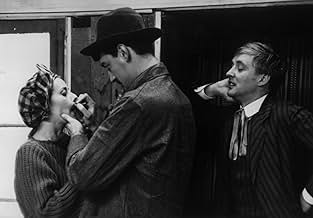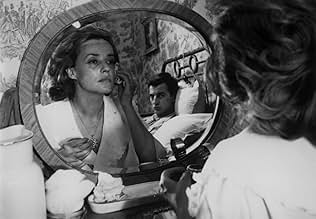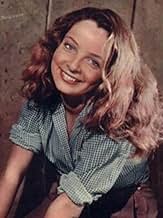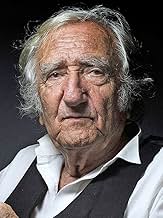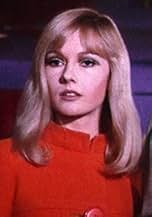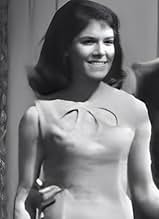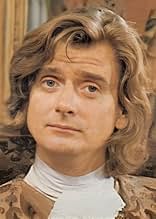CALIFICACIÓN DE IMDb
7.7/10
46 k
TU CALIFICACIÓN
Décadas de un triángulo amoroso entre dos amigos y una impulsiva mujer.Décadas de un triángulo amoroso entre dos amigos y una impulsiva mujer.Décadas de un triángulo amoroso entre dos amigos y una impulsiva mujer.
- Dirección
- Guionistas
- Elenco
- Nominada a2premios BAFTA
- 3 premios ganados y 4 nominaciones en total
Oskar Werner
- Jules
- (as Oscar Werner)
Serge Rezvani
- Albert
- (as Bassiak)
Michel Subor
- Récitant
- (voz)
- …
Danielle Bassiak
- Compagnon d'Albert
- (sin créditos)
Elen Bober
- Mathilde
- (sin créditos)
Pierre Fabre
- Ivrogne in Cafe'
- (sin créditos)
Dominique Lacarrière
- Une des femmes
- (sin créditos)
Bernard Largemains
- Merlin
- (sin créditos)
Kate Noelle
- Birgitta
- (sin créditos)
Jean-Louis Richard
- Cliente au Cafe'
- (sin créditos)
Michel Varesano
- Cliente au Cafe'
- (sin créditos)
Christiane Wagner
- Helga
- (sin créditos)
- Dirección
- Guionistas
- Todo el elenco y el equipo
- Producción, taquilla y más en IMDbPro
Opiniones destacadas
Those with heavy sensibilities along the lines of conventional "morality" seem to have a hard time allowing themselves to enjoy this film for what it is: A beautiful visual poem about the passing of time and the progression and growth of an unusual friendship. This friendship may be unusual but feels completely natural and true. Jules and Jim if anything, exhibit great maturity in their relationship with each other and Catherine. It's refreshing to see a film dealing with a deep love, friendship and emotional bond between two males and a mutual love for a woman, without the usual competitiveness and controlling possessiveness that is the norm. Jules and Jim come off more as an enlightened pair. It seems understood among them there is no real belonging of one human being to another. Catherine's whims of the heart are discussed between them at every stage throughout the film and they are willing to accept them and love her for who she is as well as each other.
I do feel that this film lost it's pacing toward the end and seemed to speed up to conclusion. That being it's only flaw. Visually it is stunning. Francois Truffaut was a poet with the camera and his subtle nuances are captivating. The scenes of Jules, Jim and Catherine enjoying days together seem so natural and evoke the feel of wonderful days spent together among best friends that transported me back to days gone by.
"we met with a kiss/ a hit, then a miss/ and we parted/ we went our own ways/ in life's whirlpool of days/ around and around we go/ together bound/ together bound."
I do feel that this film lost it's pacing toward the end and seemed to speed up to conclusion. That being it's only flaw. Visually it is stunning. Francois Truffaut was a poet with the camera and his subtle nuances are captivating. The scenes of Jules, Jim and Catherine enjoying days together seem so natural and evoke the feel of wonderful days spent together among best friends that transported me back to days gone by.
"we met with a kiss/ a hit, then a miss/ and we parted/ we went our own ways/ in life's whirlpool of days/ around and around we go/ together bound/ together bound."
Two lads from different backgrounds form a bond, a French boy with dark hair, an Austrian blond, quite Bohemian in their ways, taking pleasure all their days, and then Catherine makes it three, and waves her wand. Jim is smitten with this beauty and he falls, but then war breaks out, and homeland duty calls, so they marry, relocate, intense fighting means a break, she has a child, world reconciles, and bonds remake. Jules travels to the home of his two friends, where the triangle rotates, gyrates and bends, now he's coupled with Catherine, but Jim feels no chagrin, though it's clear this isn't where the story ends.
Jeanne Moreau is always outstanding!
Jeanne Moreau is always outstanding!
Although "Jules and Jim" was made over 40 years ago and takes place 40 to 50 years before that, the amazing thing is that it barely seems to have dated. Because it focuses on the universal human relationships between its characters, rather than the specific time in which they live, it's the rare film set in the past that doesn't feel like a "period film." And, especially in the first half of the movie, Truffaut's New Wave techniques lend a remarkable energy and freshness.
The movie explores friendship and love among three semi-bohemian types: Parisian Jim (Henri Serre), Austrian Jules (Oskar Werner), and Catherine (Jeanne Moreau), the beautiful, free-spirited woman whom they both love. She's the most vibrant character in the movie, and impossible to pin down. It's never clear who she lovesshe contradicts herself repeatedly, and perhaps loves no one but herselfor whether she's diabolical or simply misunderstood. Moreau nearly steals the movie, if not for the fact that the title reminds us to focus on the relationship between the two men, and that Serre and Werner give good performances too. Even if Jim and Jules aren't as mysterious as Catherine, they're complex and interesting characters in their own right.
The story plays out rather episodically, which means "Jules and Jim" is full of wonderful little moments, often involving the crazy things Catherine does. Some of my favorites include her dressing up as a man and racing Jules and Jim across a bridge; her jumping into the Seine in frustration; and her singing the movie's charming theme song, "The Whirlpool of Life." The episodes are linked together by surprisingly unobtrusive off-screen narration, which keeps the film moving along rather than slowing it down.
"Jules and Jim" does get a little tiresome toward the end, with Catherine continually vacillating between the men in her life, Jim vacillating between Catherine and his old girlfriend Gilberte, and Jules remaining loyally devoted to Catherine despite how foolish this may seem. However, the movie is redeemed by its tragic final scenes, which poignantly contrast with the carefree gaiety of the beginning. Jules, Jim, and Catherine are caught in a destructive spiral, tossed and defeated by the whirlpool of life. Still, the tone of the movie is gentle and human, not pessimistic. Truffaut considered "Jules and Jim" a "hymn to life," and it is most memorable as a vivid celebration of friendship and youthful possibility, even as it acknowledges how those things can sour.
The movie explores friendship and love among three semi-bohemian types: Parisian Jim (Henri Serre), Austrian Jules (Oskar Werner), and Catherine (Jeanne Moreau), the beautiful, free-spirited woman whom they both love. She's the most vibrant character in the movie, and impossible to pin down. It's never clear who she lovesshe contradicts herself repeatedly, and perhaps loves no one but herselfor whether she's diabolical or simply misunderstood. Moreau nearly steals the movie, if not for the fact that the title reminds us to focus on the relationship between the two men, and that Serre and Werner give good performances too. Even if Jim and Jules aren't as mysterious as Catherine, they're complex and interesting characters in their own right.
The story plays out rather episodically, which means "Jules and Jim" is full of wonderful little moments, often involving the crazy things Catherine does. Some of my favorites include her dressing up as a man and racing Jules and Jim across a bridge; her jumping into the Seine in frustration; and her singing the movie's charming theme song, "The Whirlpool of Life." The episodes are linked together by surprisingly unobtrusive off-screen narration, which keeps the film moving along rather than slowing it down.
"Jules and Jim" does get a little tiresome toward the end, with Catherine continually vacillating between the men in her life, Jim vacillating between Catherine and his old girlfriend Gilberte, and Jules remaining loyally devoted to Catherine despite how foolish this may seem. However, the movie is redeemed by its tragic final scenes, which poignantly contrast with the carefree gaiety of the beginning. Jules, Jim, and Catherine are caught in a destructive spiral, tossed and defeated by the whirlpool of life. Still, the tone of the movie is gentle and human, not pessimistic. Truffaut considered "Jules and Jim" a "hymn to life," and it is most memorable as a vivid celebration of friendship and youthful possibility, even as it acknowledges how those things can sour.
There is a book by Goethe mentioned in this movie, it's "Wahlverwandschaften", and its appearance is quite meaningful. Because the movie takes a look on human loves and lives that is quite similar to older Goethe's fatalistic world-view in his novel, very far from hope and idealisms. Strength (Moreau's character) and Weakness (Jim) are equal forces of nature, and both conduct us to death. The stoic attitude (Jules) is resignation and, seen this way, it is "weakness" too, but, on the other hand, it seems to be the STRONGEST way, because it means survival. JULES ET JIM, both in its content and in its aesthetics, has an air of antique tragedies, but - and this is more like the German novel - without complain, without crying. That's why it leaves you so "unsatisfied", and that's why it's still disturbing, even today.
Jules (Oskar Werner), an introspective Austrian and Jim (Henri Serre) a confident Frenchman begin a friendship that defies understanding. What begins as an exchange and discourse over art develops into a bond that seems able to withstand anything, including fighting against each other in WWI. After the war has ended, the duo goes on sharing art and women with each other, until Jules falls in love with Catherine (Jeanne Moreau), a free-spirited woman with an unpredictable temperament, prone to emotional outbursts. Despite the easy-going inexperienced Jules being an odd fit for Catherine, he asks Jim not to chase Catherine, so he can have her love all to himself. Despite Jules' request, he invites Jim on many of the couple's outings and the trio spends most of their time together. Even after Catherine and Jules marry and have a child, Jim is invited to live in their home with them. Over time, an intimacy begins to develop between Jim and Catherine, which Jules is aware of. Instead of risking losing his friend or his marriage Jules allows the intimacy to blossom which creates a domino effect of emotions between the three of them. Life no longer is about what each wants individually, but rather what each other wants and expects and what kind of life they want the other to fulfill. The decision to allow the three-way relationship has enduring effects on all involved due to the complicated nature of the two men's love for Catherine, as well as their devotion to each other. Bonds will be tested, as Jules and Jim face another war, this time, off the battlefield.
"You said, "I love you," I said, "Wait." I was going to say, "Take me," you said, "Go away." Arguably the most memorable quote from Jules and Jim also acted as a heart-wrenching opening, conveying to the audience just how much of an emotional experience they were in for. As we are introduced to each character, Truffaut takes his deliberate time revealing what Jules and Jim mean to each other. It is Truffaut's prowess as a director that allows the audience to truly understand the depth of devotion that Jules and Jim share for each other. Without his labored efforts, the rest of the story would pass by unnoticed because this truly is a story about three people in love rather than a love triangle with each point seeking out the object of their affection. The story relies on the understanding that neither Jules, Jim, nor Catherine will seek to fulfill their own needs at the expense of each other. Technically, Truffaut showed mastery on only his third feature film. His use of freeze frames was fantastic and essential in allowing the audience to realize the profound effect on the emotional state of the men involved with Catherine, each "moved by a symbol they could not understand." Truffaut also uses the overlay technique a few times to great success, placing Catherine's face over a few scenes really driving home the idea that every thought or activity Jules and Jim ever took part in was driven by Catherine. In just three short years since his first feature, The 400 Blows--a masterpiece in its own right, Truffaut further revealed his mastery for capturing the complexity of human emotion like few others before him.
Few films tackle the emotionally intense themes Jules and Jim take on. Truffaut delves into pain, the kind of pain that is caused by yearning in love. Love and lust is a theme constantly at the forefront of the film, as well, along with a precise distinction between the two. Jules, lacking the romantic experience of Jim, attempts to shield Catherine from Jim for fear that he will only lust after her. When it becomes clear that Jim actually loves Catherine, as Jules does, he relents and decides to share his love of Catherine with Jim. Jules loves Catherine and shares a devotion to Jim, so he supports a union between Jim and Catherine because he needs to be a part of each's life and wants happiness for all parties involved, and vice-versa for Catherine and Jim. Devotion, like I have never since seen replicated on screen, is the driving force behind each character's actions and thoughts. The way Truffaut managed to capture that devoted motivation shows impeccable insight to the human spirit and cements him as the purest most personal filmmaker I have ever seen. Running the gamut of emotional commentary, Truffaut also successfully illustrates loneliness, especially experienced by Catherine, and its power over life. Catherine is clearly a damaged soul, she has met and overcome many obstacles in her life, most of which, are only alluded to. There are aspects of both Jules and Jim that she depends on for her very survival, necessitating that they both remain in her life. Catherine has been unable to commit to another due to her expectation of being abandoned, as only hinted to in a couple of scenes between her and Jules. It is this damage that makes her reckless and prompts Jules and Jim to be more cautious in their interactions with her. To be able to show every unlikeable aspect of a human being, yet, still endear that person in the hearts of the audience was a skill no one in the history of cinema has been more proficient at than Francois Truffaut. By the film's conclusion, we may not have that ending that leaves each better off and happy, but what we do get is the realization that we're all in search of our statue; that one person that is perfect to us and for us despite their obvious flaws, just as Jules and Jim traversed gardens in search of their statues before they happened upon the same one, and once we find that statue, we will do whatever it takes to keep it in our view.
"You said, "I love you," I said, "Wait." I was going to say, "Take me," you said, "Go away." Arguably the most memorable quote from Jules and Jim also acted as a heart-wrenching opening, conveying to the audience just how much of an emotional experience they were in for. As we are introduced to each character, Truffaut takes his deliberate time revealing what Jules and Jim mean to each other. It is Truffaut's prowess as a director that allows the audience to truly understand the depth of devotion that Jules and Jim share for each other. Without his labored efforts, the rest of the story would pass by unnoticed because this truly is a story about three people in love rather than a love triangle with each point seeking out the object of their affection. The story relies on the understanding that neither Jules, Jim, nor Catherine will seek to fulfill their own needs at the expense of each other. Technically, Truffaut showed mastery on only his third feature film. His use of freeze frames was fantastic and essential in allowing the audience to realize the profound effect on the emotional state of the men involved with Catherine, each "moved by a symbol they could not understand." Truffaut also uses the overlay technique a few times to great success, placing Catherine's face over a few scenes really driving home the idea that every thought or activity Jules and Jim ever took part in was driven by Catherine. In just three short years since his first feature, The 400 Blows--a masterpiece in its own right, Truffaut further revealed his mastery for capturing the complexity of human emotion like few others before him.
Few films tackle the emotionally intense themes Jules and Jim take on. Truffaut delves into pain, the kind of pain that is caused by yearning in love. Love and lust is a theme constantly at the forefront of the film, as well, along with a precise distinction between the two. Jules, lacking the romantic experience of Jim, attempts to shield Catherine from Jim for fear that he will only lust after her. When it becomes clear that Jim actually loves Catherine, as Jules does, he relents and decides to share his love of Catherine with Jim. Jules loves Catherine and shares a devotion to Jim, so he supports a union between Jim and Catherine because he needs to be a part of each's life and wants happiness for all parties involved, and vice-versa for Catherine and Jim. Devotion, like I have never since seen replicated on screen, is the driving force behind each character's actions and thoughts. The way Truffaut managed to capture that devoted motivation shows impeccable insight to the human spirit and cements him as the purest most personal filmmaker I have ever seen. Running the gamut of emotional commentary, Truffaut also successfully illustrates loneliness, especially experienced by Catherine, and its power over life. Catherine is clearly a damaged soul, she has met and overcome many obstacles in her life, most of which, are only alluded to. There are aspects of both Jules and Jim that she depends on for her very survival, necessitating that they both remain in her life. Catherine has been unable to commit to another due to her expectation of being abandoned, as only hinted to in a couple of scenes between her and Jules. It is this damage that makes her reckless and prompts Jules and Jim to be more cautious in their interactions with her. To be able to show every unlikeable aspect of a human being, yet, still endear that person in the hearts of the audience was a skill no one in the history of cinema has been more proficient at than Francois Truffaut. By the film's conclusion, we may not have that ending that leaves each better off and happy, but what we do get is the realization that we're all in search of our statue; that one person that is perfect to us and for us despite their obvious flaws, just as Jules and Jim traversed gardens in search of their statues before they happened upon the same one, and once we find that statue, we will do whatever it takes to keep it in our view.
¿Sabías que…?
- TriviaHenri-Pierre Roché's original novel was based on his own experiences as a young man. The original Catherine was still alive when the film was released and even attended the premiere incognito.
- ErroresWhen Catherine lights the letters on fire, they are at first away from her dress, but in the next shot they are burning on top of her dress.
- Versiones alternativasThe Criterion Region 1 disc and the Tartan Region 2 DVD have a scene in which the film is reversed left/right. When Jules, Jim, and Albert are sitting on the grass sharing stories about the war, the order of the three characters repeatedly changes between shots. This does not occur in other DVD releases of this film, including the Fox/Lorber Region 1 release.
- ConexionesEdited into Laggiù qualcuno mi ama (2023)
Selecciones populares
Inicia sesión para calificar y agrega a la lista de videos para obtener recomendaciones personalizadas
- How long is Jules and Jim?Con tecnología de Alexa
Detalles
- Fecha de lanzamiento
- País de origen
- Idiomas
- También se conoce como
- Jules and Jim
- Locaciones de filmación
- Productoras
- Ver más créditos de la compañía en IMDbPro
Taquilla
- Total en EE. UU. y Canadá
- USD 509
- Fin de semana de estreno en EE. UU. y Canadá
- USD 11,206
- 25 abr 1999
- Total a nivel mundial
- USD 496,383
- Tiempo de ejecución1 hora 45 minutos
- Color
- Mezcla de sonido
- Relación de aspecto
- 2.35 : 1
Contribuir a esta página
Sugiere una edición o agrega el contenido que falta

Principales brechas de datos
By what name was Jules y Jim (1962) officially released in India in English?
Responda
![Ver Bande-annonce [OV]](https://m.media-amazon.com/images/M/MV5BMWM5OGI0MjUtZDRhMC00ZGQ1LTk0NWEtMWMzZDFhMjA1OTk1XkEyXkFqcGdeQXRodW1ibmFpbC1pbml0aWFsaXplcg@@._V1_QL75_UX500_CR0)
